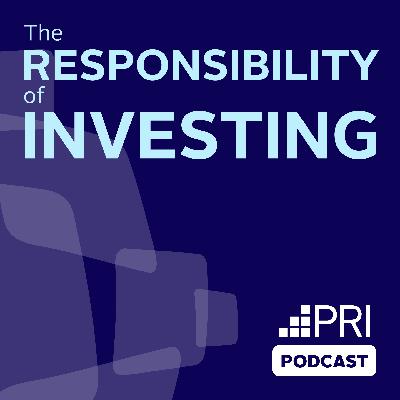Decommissioning brown assets: turning environmental liabilities into transition opportunities
Description
In this episode, Nathan Fabian, Chief Sustainable Systems Officer at the PRI, examines what happens to the world’s ageing, high-emitting infrastructure—and why the way we decommission these assets is central to a just and orderly transition. He is joined by Julien Halfon, Head of Corporate and Pensions Solutions at BNP Paribas Asset Management, whose team estimates there are at least US$7.5 trillion in unfunded decommissioning costs embedded in today’s energy and industrial systems. Together, they explore how responsible investors can move from walking away from “brown” assets to actively stewarding them through end of life, clean-up and repurposing.
Overview
The conversation begins with Julien outlining the research behind the US $7.5–8 trillion decommissioning liability estimate, drawing on global studies from regulators, multilateral institutions and sectoral assessments. He explains how decommissioning liabilities emerged from the nuclear sector and is now a critical but underfunded obligation across oil and gas, mining, coal power and even renewables. Only a small fraction—mainly in nuclear—has been pre-funded, leaving governments, taxpayers and future generations exposed.
Nathan and Julien then unpack why responsible investors cannot simply divest from polluting assets and “leave the mess behind”. In a diversified portfolio, the costs of unmanaged decommissioning, stranded infrastructure and damaged communities reverberate across the wider economy. The discussion reframes decommissioning as part of long-term stewardship: engaging through the full lifecycle of assets, recognising decommissioning as a real liability, and using innovative instruments such as transition and decommissioning bonds to convert environmental debts into investable, long-term solutions.
Detailed Coverage
The decommissioning gap
Julien explains BNP Paribas Asset Management’s estimate of roughly US$8 trillion in decommissioning liabilities, of which around US$7.5 trillion remains unfunded once existing nuclear reserves are stripped out. Current corporate provisions fall far short of this figure, leaving a significant hidden risk.
Why end-of-life stewardship matters
Using examples such as abandoned copper mines, he illustrates how poorly managed closures can leave toxic legacies, stranded communities and fiscal burdens for governments—costs that ultimately flow back to diversified investors through sovereign and systemic risk.
From cost centre to opportunity
The episode highlights how active stewardship can unlock value from “end-of-life” assets, from re-mining tailings for valuable metals to repurposing industrial hubs, offshore platforms or nuclear sites into data centres, wind farms and other green infrastructure.
Financing the transition: decommissioning and transition bonds
Julien sets out how decommissioning and transition bonds can pre-fund clean-up and rehabilitation by transforming environmental liabilities into transparent financial ones, while freeing equity capital for redevelopment. Investor appetite has been strong, given the measurable nature of decommissioning activities and the clear brown-to-green trajectory.
Policy, pensions and local communities
Drawing on defined benefit pension frameworks, the discussion explores how tax-advantaged, ring-fenced decommissioning funds and supportive local development policies can help manage liabilities, protect communities and scale new markets for repurposed assets.
Find out more about the PRI’s work on climate and environmental issues at www.unpri.org/responsible-investment/sustainability-issues
Chapters
00:43 – Introduction: why decommissioning matters for responsible investors
01:59 – Julien Halfon on the US$7.5 trillion decommissioning gap
04:31 – Why investors can’t simply divest from “brown” assets
06:43 – Stewardship through end of life: staying engaged with legacy assets
07:51 – From liability to opportunity: repurposing mines, nuclear sites and hubs
11:23 – Transition and decommissioning bonds: funding clean-up and redevelopment
14:45 – Early issuances and investor appetite for decommissioning bonds
17:30 – Risks from short-termism, asset transfers and weak disclosure
23:14 – Real-world examples of repurposing and urban transformation
24:30 – The looming crunch: decommissioning fossil and ageing renewables together
28:40 – What policy and tax frameworks are needed to support decommissioning?
30:18 – Local communities, pension lessons and the North Sea opportunity
33:15 – Signposts for progress and scaling decommissioning markets
37:51 – The responsibility of investing: intergenerational stewardship and systems change
Disclaimer
This podcast and material referenced herein is provided for information only. It is not intended to be investment, legal, tax or other advice, nor is it intended to be relied upon in making an investment or other decision. PRI Association is not responsible for any decision made or action taken based on information on this podcast. Listeners retain sole discretion over whether and how to use the information contained herein. PRI Association is not responsible for and does not endorse third parties featured on in this podcast or any third-party comments, content or other resources that may be included or referenced herein. Unless otherwise stated, podcast content does not necessarily represent the views of signatories to the Principles for Responsible Investment. All information is provided “as is” with no guarantee of completeness, accuracy or timeliness, or of the results obtained from the use of this information, and without warranty of any kind, expressed or implied. PRI Association is committed to compliance with all applicable laws. Copyright © PRI Association 2025. All rights reserved. This content may not be reproduced, or used for any other purpose, without the prior written consent of PRI Association.





